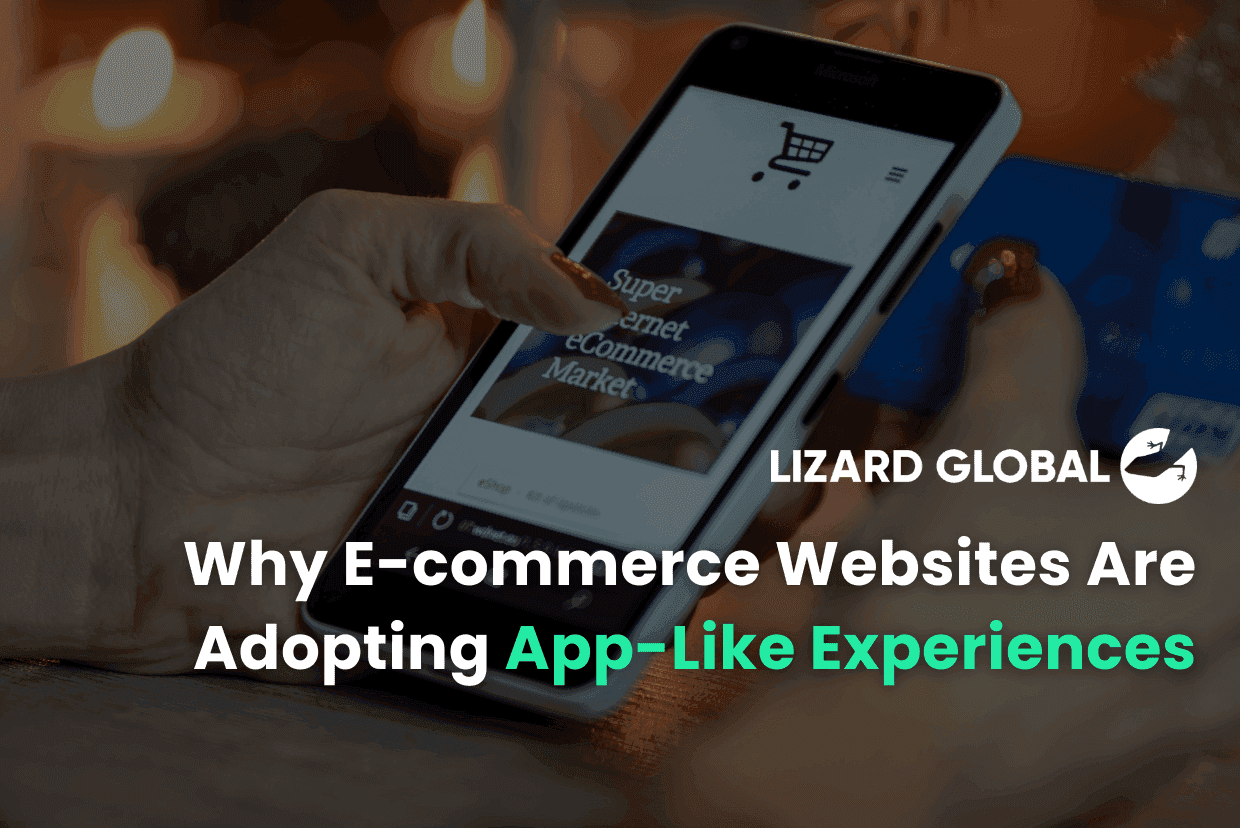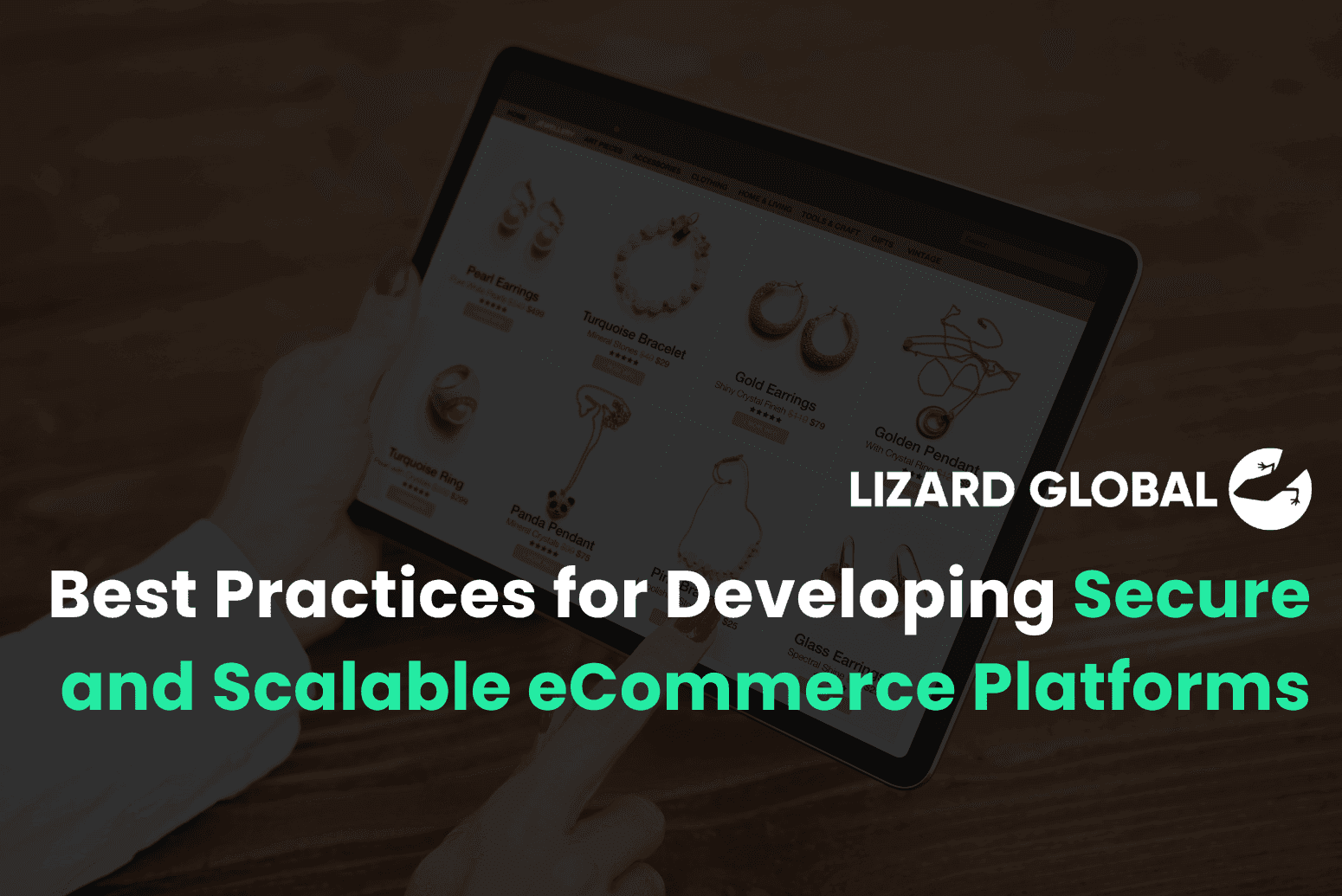iOS
Android
+ 4 more ...
iOS, Android or Cross-Platform: Which Should You Choose For Your App Development?

10 Oct 2024
by Nadiy, Senior Content Writer

10 Oct 2024
by Nadiy, Senior Content Writer
iOS
Android
Cross-Platform Development
Mobile App Development
Web App Development
Software Development
iOS, Android or Cross-Platform: Which Should You Choose For Your App Development?
Table of contents
Contact us
We will get back to you in the next 48 hours.

iOS, Android or Cross-Platform Which Should You Choose For Your App Development
Deciding between iOS, Android, or cross-platform app development can be daunting. This blog breaks down the pros and cons of each option, helping you determine the best approach based on your audience, budget, and app complexity. Whether you're seeking maximum reach or optimized performance, we've got you covered with insights to make the right choice for your business.
key takeaways
When embarking on the journey to create a mobile app, one of the critical decisions you will face is whether to develop for iOS, Android, or opt for a cross-platform approach. This choice will impact the app's user experience, cost, development timeline, and future scalability. Each platform has its own strengths and challenges, so it's essential to assess your goals, target audience, budget, and long-term vision before making a decision.
Let’s dive into the key factors to consider when choosing between iOS, Android, or cross-platform development, helping you make an informed decision that aligns with your business needs.
iOS App Development: A Premium Experience
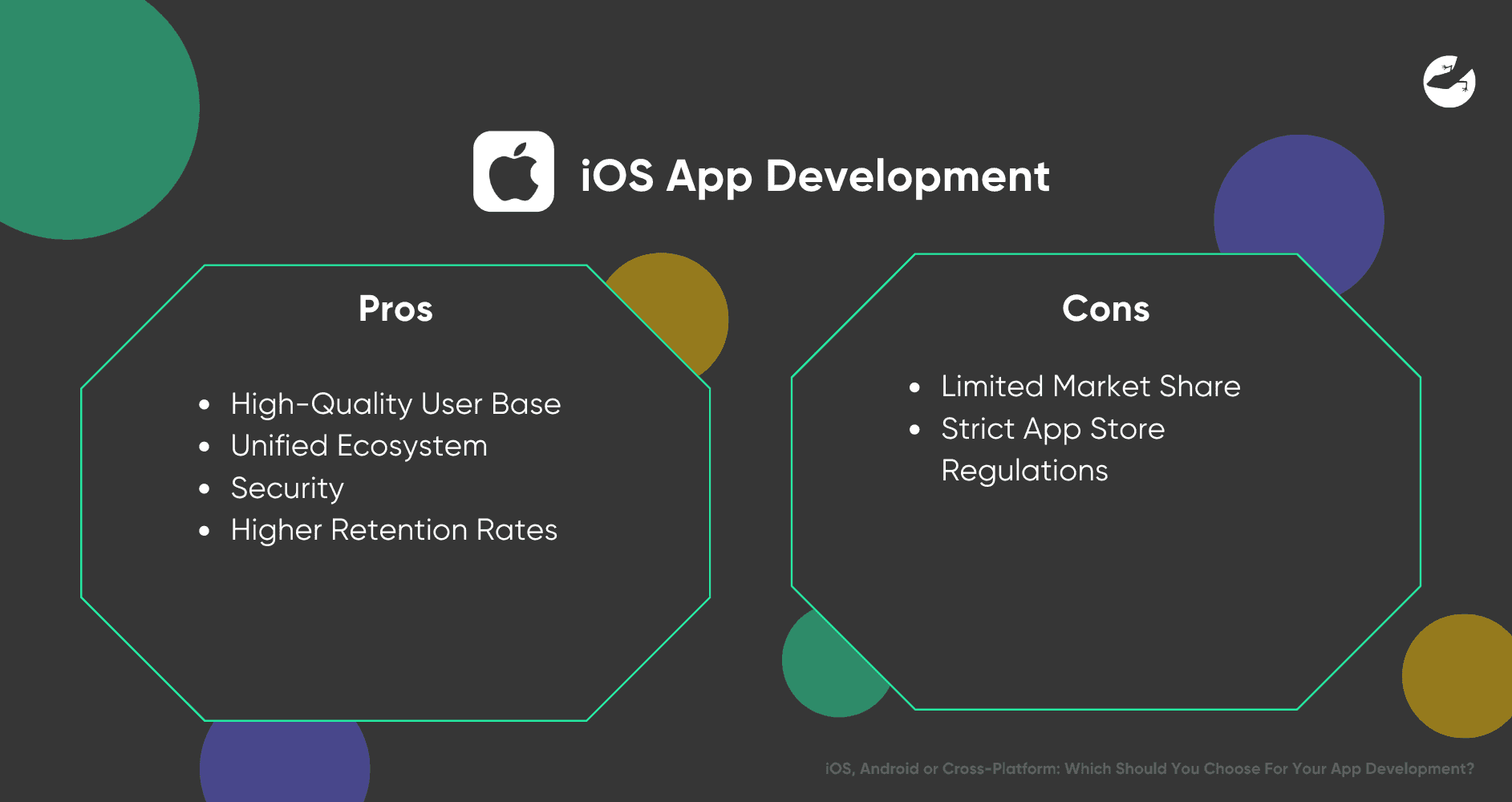
When it comes to iOS development, Apple’s tightly controlled ecosystem is a major advantage. Known for its polished, premium user experience, iOS is a top choice for businesses looking to target higher-income users in regions like North America and Europe. With fewer device variations and a more streamlined OS, iOS apps typically offer consistent performance and a higher level of security.
But is focusing on iOS right for your app? Let’s explore the pros and cons to find out.
Pros:
High-Quality User Base: iOS users tend to belong to a higher-income demographic and are more willing to spend money on apps. This makes iOS an excellent choice if your app monetization strategy is based on paid apps or in-app purchases.
Unified Ecosystem: Apple controls both the hardware and software, resulting in less device fragmentation. As a result, iOS apps generally run smoothly across all supported devices, reducing testing complexity.
- Security
: iOS is known for its stringent security measures, making it a preferred choice for apps that handle sensitive data, such as financial or health-related applications.
- Higher Retention Rates
: Studies show that iOS apps tend to retain users more effectively. This can translate into higher engagement and loyalty, which is crucial for long-term growth.
Cons:
Limited Market Share: While iOS users are known for their spending habits, the global market share for Android is significantly larger. By focusing solely on iOS, you may miss out on reaching the majority of mobile users, particularly in regions where Android dominates.
App Store Regulations: Apple’s App Store has strict submission guidelines, which can delay or even prevent your app from being launched if it doesn't meet their standards.
Android App Development: Broad Reach and Flexibility
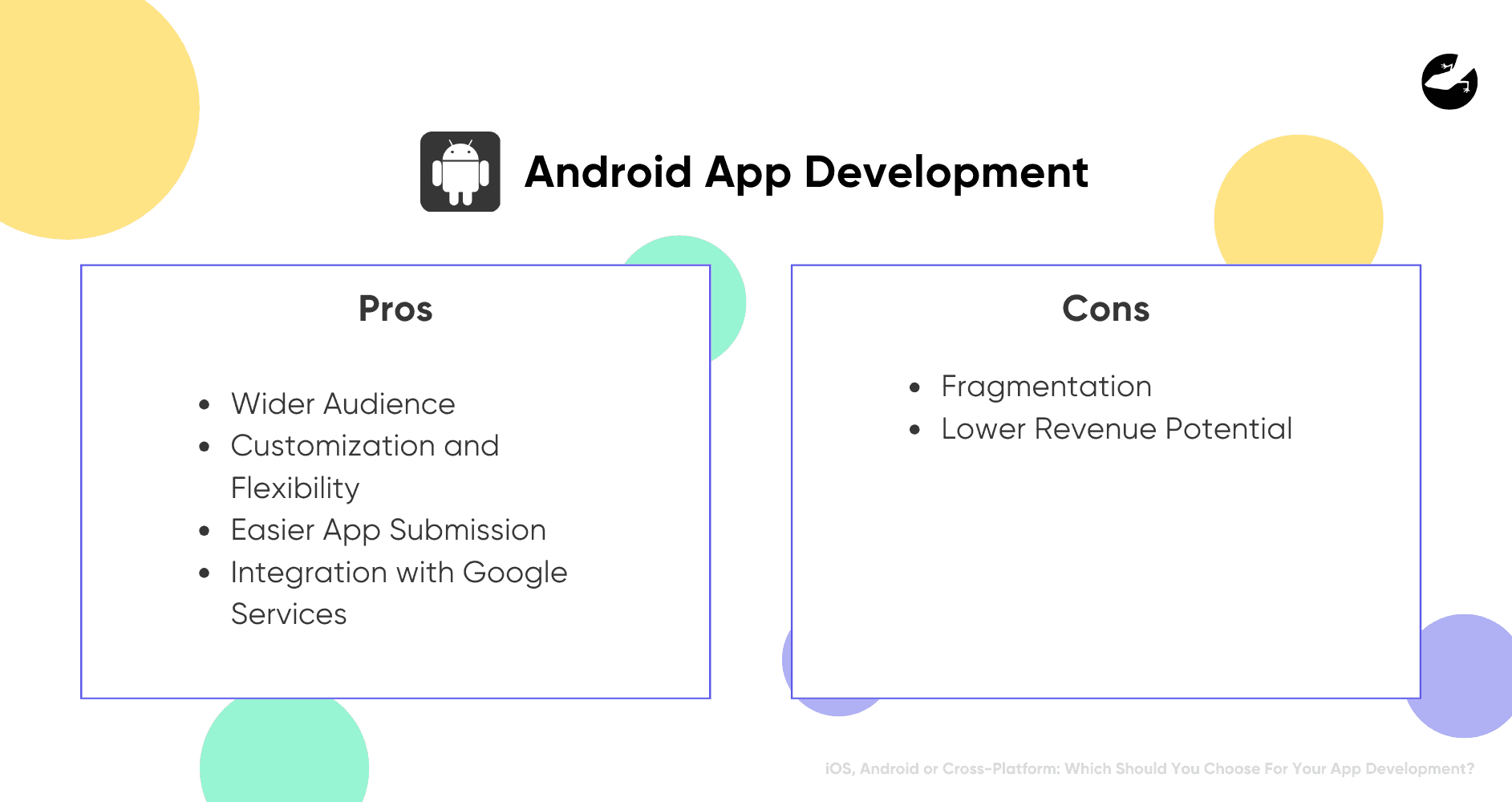
Android’s open-source platform provides access to a global user base, especially in emerging markets. With the majority of the world’s mobile users on Android devices, this platform offers immense potential for businesses looking to expand their reach. Flexibility, customization, and seamless integration with Google services make Android a go-to choice for many developers.
However, Android’s fragmentation can lead to unique challenges, particularly when ensuring smooth app performance across diverse devices. Here's what you need to know before opting for Android development.
Pros:
Wider Audience: Android holds the majority share of the global mobile market. If your target audience includes users from emerging markets like Asia, Africa, or Latin America, Android is the way to go.
Customization and Flexibility: Android's open-source nature offers more flexibility in terms of app customization. You can develop unique features and functions without being constrained by strict platform guidelines.
Easier App Submission: Google Play Store has more relaxed submission policies compared to the iOS App Store, which means faster approval times for your app to go live.
Integration with Google Services: Android apps integrate seamlessly with Google's ecosystem, which includes tools like Google Maps, Google Pay, and Google Analytics, making it ideal for apps that rely on these services.
Cons:
Fragmentation: Android devices come in many shapes and sizes, each running different versions of the OS. This fragmentation makes it more difficult to ensure consistent performance across all devices, leading to higher testing and maintenance costs.
Lower Revenue Potential: Android users are typically less willing to pay for apps compared to iOS users. If your app’s revenue model depends heavily on in-app purchases or subscriptions, iOS may be the better option.
Want to find out how much it costs to build your dream app or web app?
Cross-Platform Development: The Best of Both Worlds?
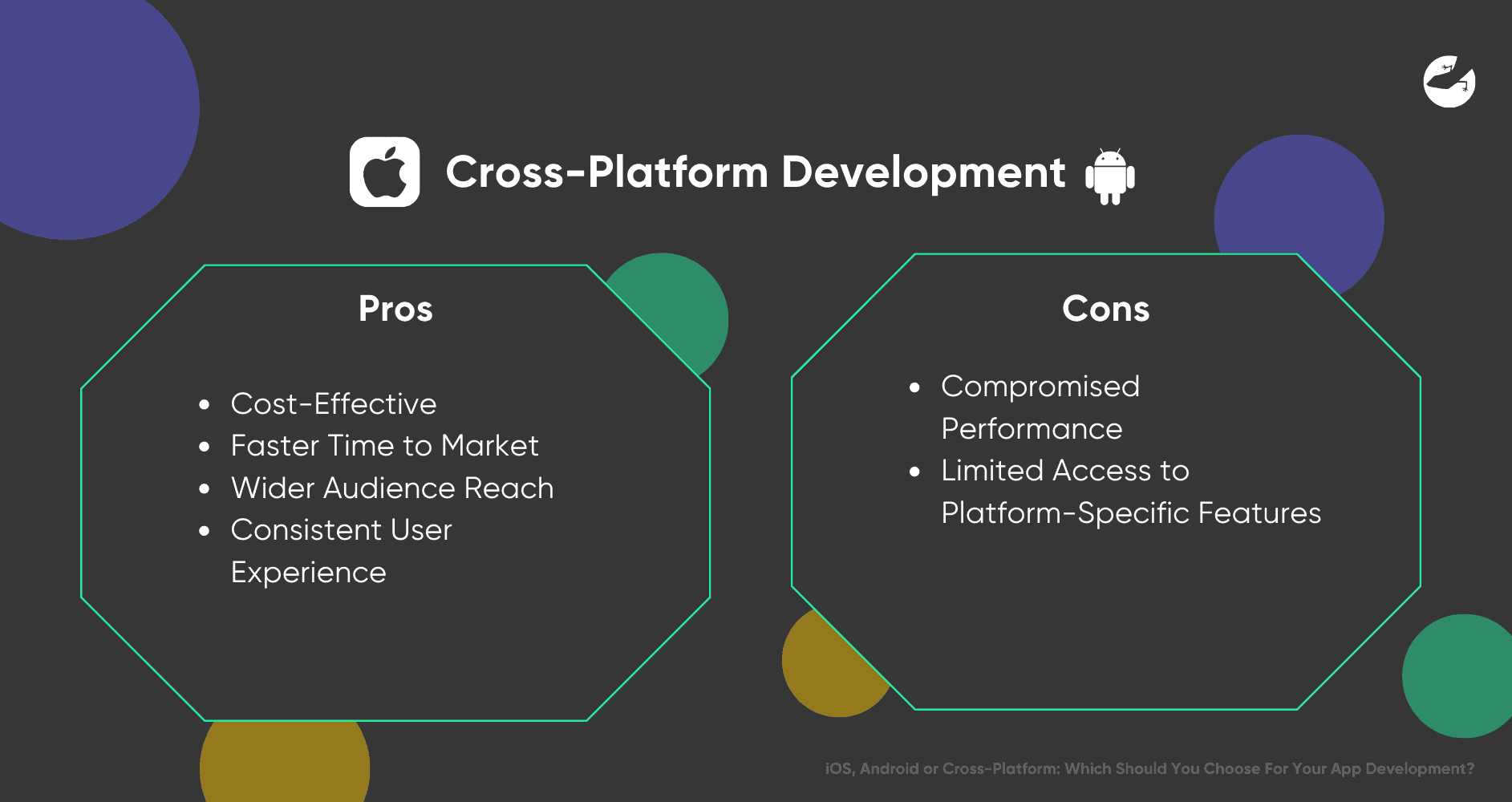
If you’re looking to hit both iOS and Android markets without the cost and time investment of developing separate apps, cross-platform development might be the perfect solution. By using a single codebase, frameworks like React Native, Flutter, or Xamarin allow you to launch your app on multiple platforms simultaneously.
While this can dramatically cut down costs and development time, there are certain trade-offs in terms of performance and access to platform-specific features. Is the cross-platform approach right for your app? Let’s weigh the benefits and drawbacks.
Pros:
Cost-Effective: One of the biggest advantages of cross-platform development is cost efficiency. By writing code once and deploying it across both iOS and Android, you significantly reduce the time and money spent on development.
Faster Time to Market: Cross-platform frameworks like React Native, Flutter, or Xamarin allow developers to build apps that can run on both platforms, reducing the overall development time. This is a great option if you're looking to get your app into the market quickly.
Wider Audience Reach: With a cross-platform approach, you can target both iOS and Android users simultaneously, broadening your potential user base from the start.
- Consistent User Experience
: Modern cross-platform tools are designed to deliver a native-like experience across platforms, ensuring that users get a high-quality interface and smooth performance, regardless of their device.
Cons:
Compromised Performance: Cross-platform apps, while improving, still can’t fully match the performance of native apps. If your app requires complex animations, advanced features, or is highly graphics-intensive, native development may offer a more optimized solution.
Limited Access to Platform-Specific Features: Although cross-platform frameworks are evolving, they may not offer full access to all the unique features of iOS or Android, especially right after the release of new OS versions.
Factors to Consider Before Making a Decision
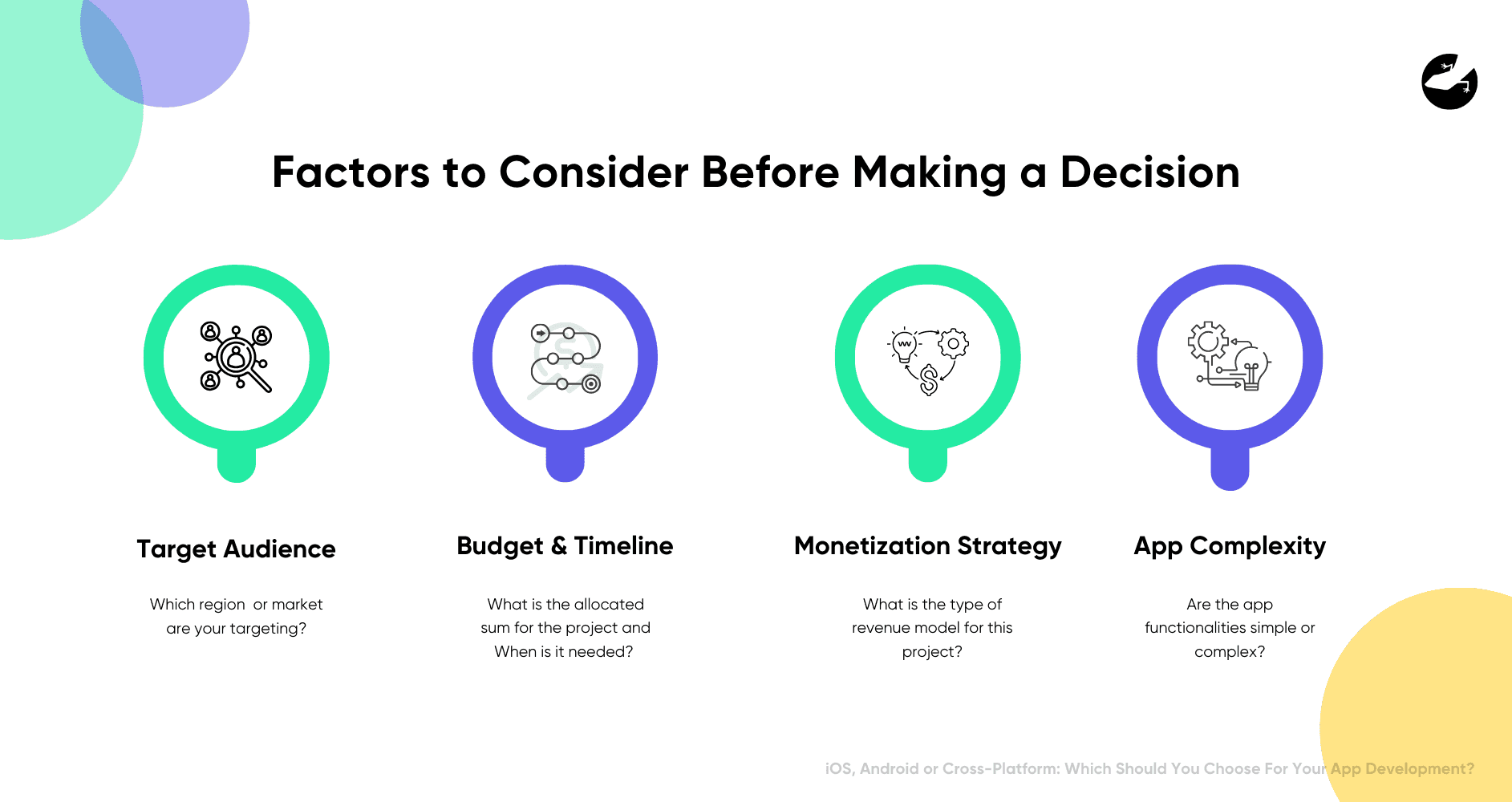
Choosing the right development path for your app depends on several crucial factors. Your target audience, budget, app complexity, and long-term goals all play a role in determining whether iOS, Android, or cross-platform is the best fit. Each option comes with its own set of advantages and limitations, and making the wrong choice can impact everything from user acquisition to scalability.
Let’s explore the critical factors you need to assess before moving forward with development.
1. Target Audience
If your app is targeting an affluent user base or regions like North America and Western Europe, iOS might be your best option. However, if you’re looking to tap into emerging markets or reach a broader audience globally, Android could offer more potential.
2. Budget and Timeline
Native app development
(iOS and Android) is more costly and time-consuming since you’ll need two separate development teams. Cross-platform development is more cost-efficient, making it an attractive option for startups and businesses with tighter budgets or a need for a faster launch.
3. Monetization Strategy
If your revenue model revolves around in-app purchases or subscriptions, iOS might be a better fit due to its higher revenue per user. However, if ad monetization is your main strategy, Android’s larger user base may yield better results.
4. App Complexity
For apps with advanced functionalities, like those requiring extensive use of device-specific features (e.g., AR/VR, camera integrations), native development may be necessary to ensure optimal performance. On the other hand, for simpler apps that don’t require deep hardware integration, cross-platform solutions are an efficient choice.
When To Choose iOS, Android or Cross-Platform
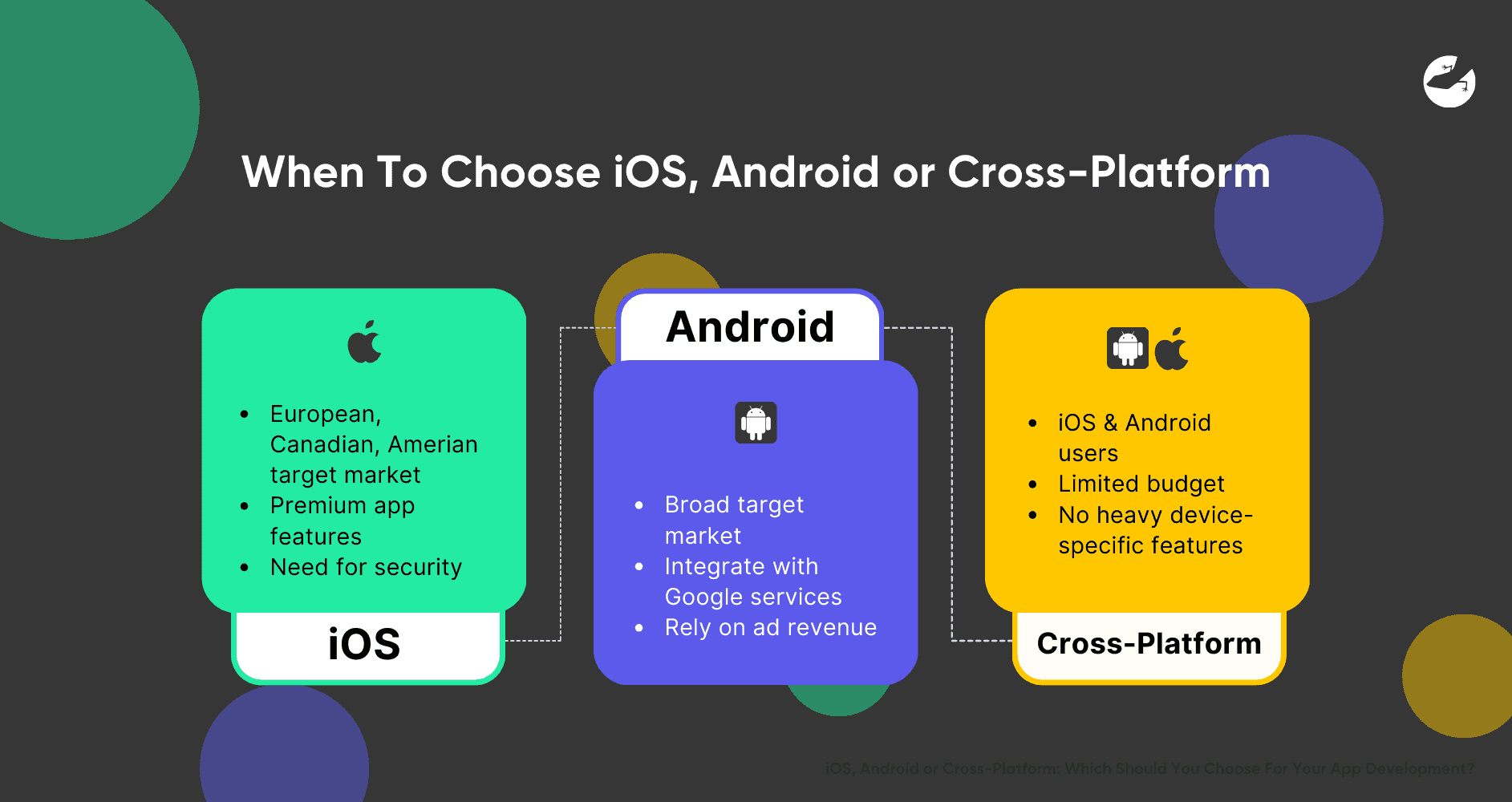
The final decision on which platform to choose ultimately comes down to the specifics of your project. If you're targeting affluent users with a premium experience, iOS might be the way to go. For a broader audience or integration with Google services, Android offers flexibility and reach. Alternatively, if you're aiming for efficiency and want to launch on both platforms quickly, cross-platform development can be a cost-effective solution.
Let’s break down the best scenarios for choosing iOS, Android, or cross-platform.
When to Choose iOS:
- If your target market is primarily in the U.S., Canada, or Western Europe.
- If you are developing an app with premium features and expect users to pay for services.
- If you need a secure, high-quality app that leverages the power of Apple’s closed ecosystem.
When to Choose Android:
- If you are targeting users in emerging markets with a broad device base.
- If you want to integrate tightly with Google services.
- If your app relies on ad revenue or has a high user acquisition strategy.
When to Choose Cross-Platform:
- If you need to reach both iOS and Android users quickly.
- If you have a limited budget but still want to offer a consistent experience across platforms.
- If your app doesn’t require heavy use of device-specific features.
Why You Should Work with Lizard Global for Your App Development
Choosing between iOS, Android, or cross-platform development can be a complex decision, and that’s where Lizard Global comes in. With years of expertise in native and cross-platform development, our team can help you navigate the pros and cons of each option to deliver a solution that best fits your needs. Whether you’re looking to build a high-performance native app or an efficient cross-platform solution, our holistic approach ensures your app is designed to engage users and scale as your business grows.

, and benefit from our personalized approach, cutting-edge technology, and commitment to delivering sustainable and innovative solutions tailored to your unique vision. Let's bring your app to life!
Join 2000+ subscribers
Stay in the loop with everything you need to know

iOS, Android or Cross-Platform Which Should You Choose For Your App Development
Deciding between iOS, Android, or cross-platform app development can be daunting. This blog breaks down the pros and cons of each option, helping you determine the best approach based on your audience, budget, and app complexity. Whether you're seeking maximum reach or optimized performance, we've got you covered with insights to make the right choice for your business.
When embarking on the journey to create a mobile app, one of the critical decisions you will face is whether to develop for iOS, Android, or opt for a cross-platform approach. This choice will impact the app's user experience, cost, development timeline, and future scalability. Each platform has its own strengths and challenges, so it's essential to assess your goals, target audience, budget, and long-term vision before making a decision.
Let’s dive into the key factors to consider when choosing between iOS, Android, or cross-platform development, helping you make an informed decision that aligns with your business needs.
iOS App Development: A Premium Experience

When it comes to iOS development, Apple’s tightly controlled ecosystem is a major advantage. Known for its polished, premium user experience, iOS is a top choice for businesses looking to target higher-income users in regions like North America and Europe. With fewer device variations and a more streamlined OS, iOS apps typically offer consistent performance and a higher level of security.
But is focusing on iOS right for your app? Let’s explore the pros and cons to find out.
Pros:
High-Quality User Base: iOS users tend to belong to a higher-income demographic and are more willing to spend money on apps. This makes iOS an excellent choice if your app monetization strategy is based on paid apps or in-app purchases.
Unified Ecosystem: Apple controls both the hardware and software, resulting in less device fragmentation. As a result, iOS apps generally run smoothly across all supported devices, reducing testing complexity.
- Security
: iOS is known for its stringent security measures, making it a preferred choice for apps that handle sensitive data, such as financial or health-related applications.
- Higher Retention Rates
: Studies show that iOS apps tend to retain users more effectively. This can translate into higher engagement and loyalty, which is crucial for long-term growth.
Cons:
Limited Market Share: While iOS users are known for their spending habits, the global market share for Android is significantly larger. By focusing solely on iOS, you may miss out on reaching the majority of mobile users, particularly in regions where Android dominates.
App Store Regulations: Apple’s App Store has strict submission guidelines, which can delay or even prevent your app from being launched if it doesn't meet their standards.
Android App Development: Broad Reach and Flexibility

Android’s open-source platform provides access to a global user base, especially in emerging markets. With the majority of the world’s mobile users on Android devices, this platform offers immense potential for businesses looking to expand their reach. Flexibility, customization, and seamless integration with Google services make Android a go-to choice for many developers.
However, Android’s fragmentation can lead to unique challenges, particularly when ensuring smooth app performance across diverse devices. Here's what you need to know before opting for Android development.
Pros:
Wider Audience: Android holds the majority share of the global mobile market. If your target audience includes users from emerging markets like Asia, Africa, or Latin America, Android is the way to go.
Customization and Flexibility: Android's open-source nature offers more flexibility in terms of app customization. You can develop unique features and functions without being constrained by strict platform guidelines.
Easier App Submission: Google Play Store has more relaxed submission policies compared to the iOS App Store, which means faster approval times for your app to go live.
Integration with Google Services: Android apps integrate seamlessly with Google's ecosystem, which includes tools like Google Maps, Google Pay, and Google Analytics, making it ideal for apps that rely on these services.
Cons:
Fragmentation: Android devices come in many shapes and sizes, each running different versions of the OS. This fragmentation makes it more difficult to ensure consistent performance across all devices, leading to higher testing and maintenance costs.
Lower Revenue Potential: Android users are typically less willing to pay for apps compared to iOS users. If your app’s revenue model depends heavily on in-app purchases or subscriptions, iOS may be the better option.
Want to find out how much it costs to build your dream app or web app?
Cross-Platform Development: The Best of Both Worlds?

If you’re looking to hit both iOS and Android markets without the cost and time investment of developing separate apps, cross-platform development might be the perfect solution. By using a single codebase, frameworks like React Native, Flutter, or Xamarin allow you to launch your app on multiple platforms simultaneously.
While this can dramatically cut down costs and development time, there are certain trade-offs in terms of performance and access to platform-specific features. Is the cross-platform approach right for your app? Let’s weigh the benefits and drawbacks.
Pros:
Cost-Effective: One of the biggest advantages of cross-platform development is cost efficiency. By writing code once and deploying it across both iOS and Android, you significantly reduce the time and money spent on development.
Faster Time to Market: Cross-platform frameworks like React Native, Flutter, or Xamarin allow developers to build apps that can run on both platforms, reducing the overall development time. This is a great option if you're looking to get your app into the market quickly.
Wider Audience Reach: With a cross-platform approach, you can target both iOS and Android users simultaneously, broadening your potential user base from the start.
- Consistent User Experience
: Modern cross-platform tools are designed to deliver a native-like experience across platforms, ensuring that users get a high-quality interface and smooth performance, regardless of their device.
Cons:
Compromised Performance: Cross-platform apps, while improving, still can’t fully match the performance of native apps. If your app requires complex animations, advanced features, or is highly graphics-intensive, native development may offer a more optimized solution.
Limited Access to Platform-Specific Features: Although cross-platform frameworks are evolving, they may not offer full access to all the unique features of iOS or Android, especially right after the release of new OS versions.
Factors to Consider Before Making a Decision

Choosing the right development path for your app depends on several crucial factors. Your target audience, budget, app complexity, and long-term goals all play a role in determining whether iOS, Android, or cross-platform is the best fit. Each option comes with its own set of advantages and limitations, and making the wrong choice can impact everything from user acquisition to scalability.
Let’s explore the critical factors you need to assess before moving forward with development.
1. Target Audience
If your app is targeting an affluent user base or regions like North America and Western Europe, iOS might be your best option. However, if you’re looking to tap into emerging markets or reach a broader audience globally, Android could offer more potential.
2. Budget and Timeline
Native app development
(iOS and Android) is more costly and time-consuming since you’ll need two separate development teams. Cross-platform development is more cost-efficient, making it an attractive option for startups and businesses with tighter budgets or a need for a faster launch.
3. Monetization Strategy
If your revenue model revolves around in-app purchases or subscriptions, iOS might be a better fit due to its higher revenue per user. However, if ad monetization is your main strategy, Android’s larger user base may yield better results.
4. App Complexity
For apps with advanced functionalities, like those requiring extensive use of device-specific features (e.g., AR/VR, camera integrations), native development may be necessary to ensure optimal performance. On the other hand, for simpler apps that don’t require deep hardware integration, cross-platform solutions are an efficient choice.
When To Choose iOS, Android or Cross-Platform

The final decision on which platform to choose ultimately comes down to the specifics of your project. If you're targeting affluent users with a premium experience, iOS might be the way to go. For a broader audience or integration with Google services, Android offers flexibility and reach. Alternatively, if you're aiming for efficiency and want to launch on both platforms quickly, cross-platform development can be a cost-effective solution.
Let’s break down the best scenarios for choosing iOS, Android, or cross-platform.
When to Choose iOS:
- If your target market is primarily in the U.S., Canada, or Western Europe.
- If you are developing an app with premium features and expect users to pay for services.
- If you need a secure, high-quality app that leverages the power of Apple’s closed ecosystem.
When to Choose Android:
- If you are targeting users in emerging markets with a broad device base.
- If you want to integrate tightly with Google services.
- If your app relies on ad revenue or has a high user acquisition strategy.
When to Choose Cross-Platform:
- If you need to reach both iOS and Android users quickly.
- If you have a limited budget but still want to offer a consistent experience across platforms.
- If your app doesn’t require heavy use of device-specific features.
Why You Should Work with Lizard Global for Your App Development
Choosing between iOS, Android, or cross-platform development can be a complex decision, and that’s where Lizard Global comes in. With years of expertise in native and cross-platform development, our team can help you navigate the pros and cons of each option to deliver a solution that best fits your needs. Whether you’re looking to build a high-performance native app or an efficient cross-platform solution, our holistic approach ensures your app is designed to engage users and scale as your business grows.

, and benefit from our personalized approach, cutting-edge technology, and commitment to delivering sustainable and innovative solutions tailored to your unique vision. Let's bring your app to life!
Join 2000+ subscribers
Stay in the loop with everything you need to know
FAQs

Which platform is best for launching an MVP (Minimum Viable Product)?
Do iOS apps cost more to develop than Android apps?
Can I switch from native to cross-platform development later?
Is cross-platform development suitable for gaming apps?
How do updates work for cross-platform apps compared to native apps?
similar reads


